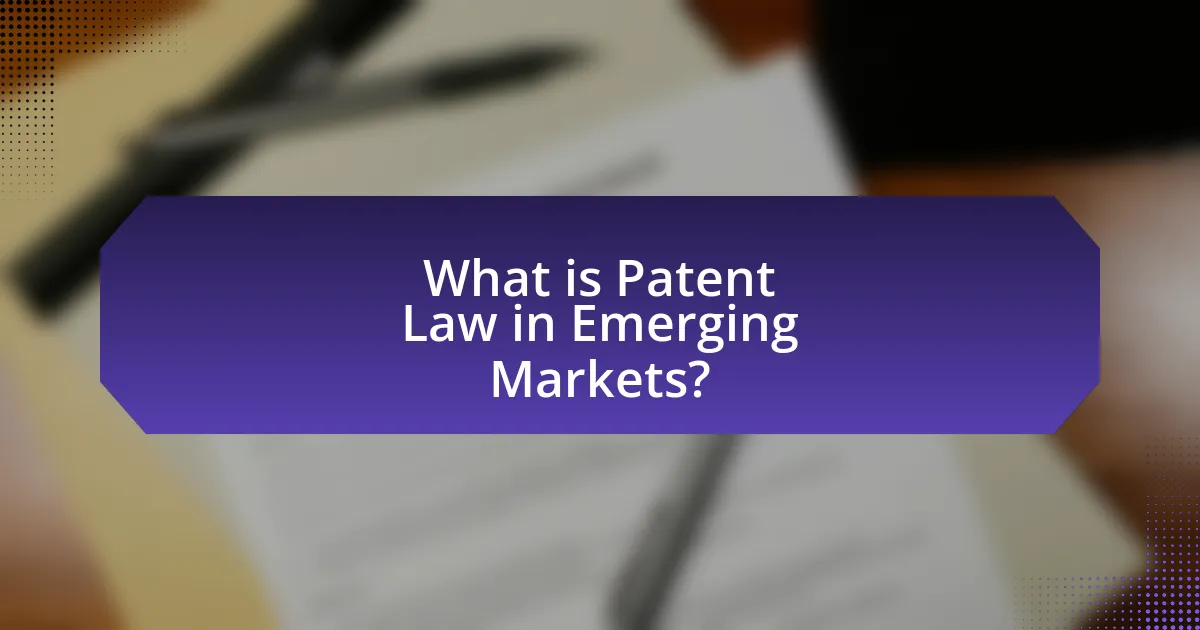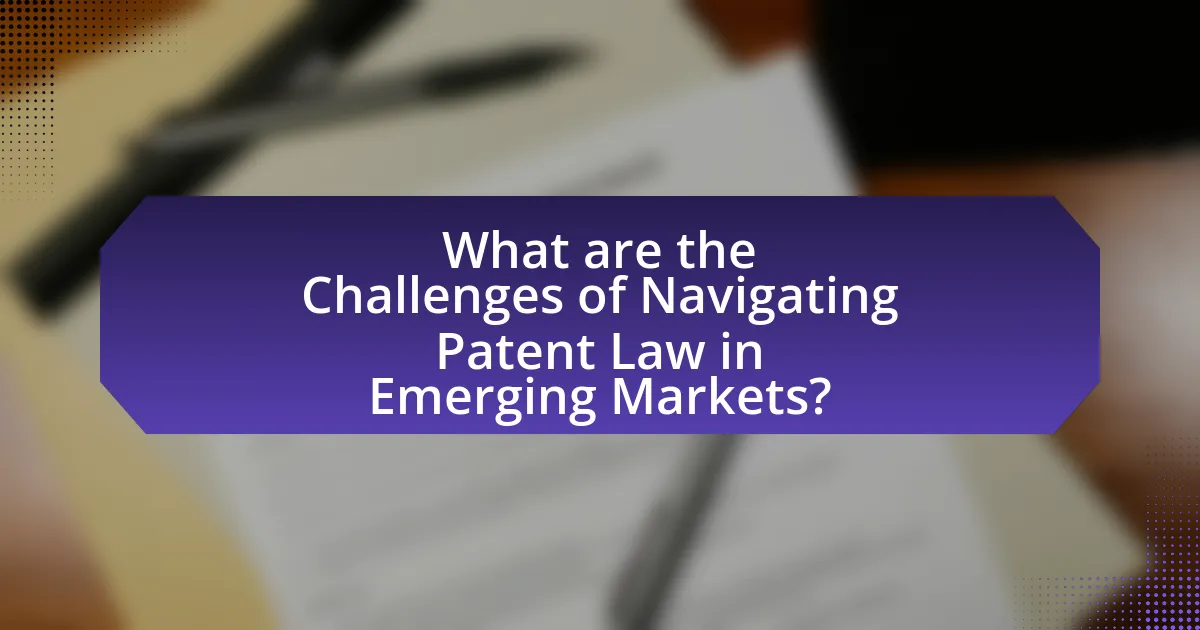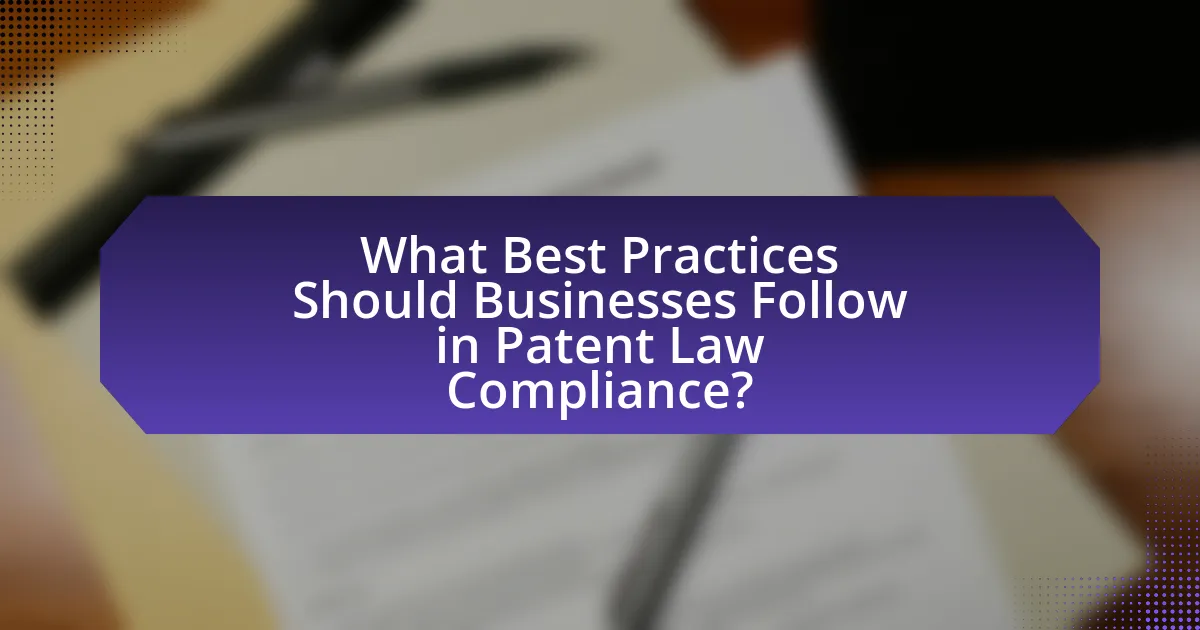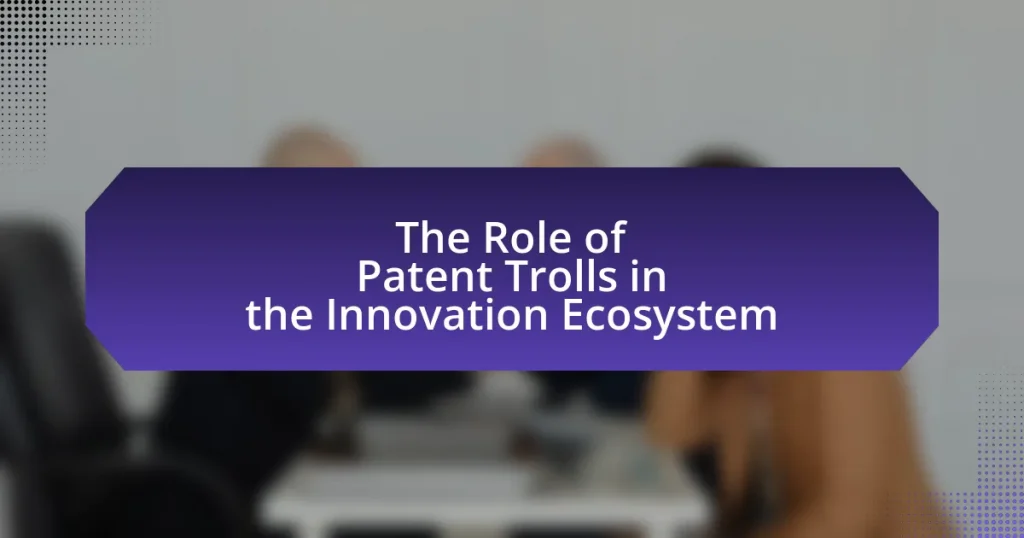Patent law in emerging markets encompasses the legal framework that protects inventions and innovations in developing economies, playing a vital role in fostering innovation and attracting foreign investment. This article examines the differences between patent law in emerging markets and developed countries, highlighting key characteristics such as flexibility in patentability criteria and varying enforcement mechanisms. It also addresses the cultural and economic factors influencing patent law, the risks businesses face without adequate knowledge, and the challenges of navigating inconsistent legal frameworks. Furthermore, the article outlines best practices for compliance, the importance of local partnerships, and resources available for understanding patent law in these regions, ultimately emphasizing the significance of effective patent navigation for business success.

What is Patent Law in Emerging Markets?
Patent law in emerging markets refers to the legal framework that governs the protection of inventions and innovations within developing economies. This framework is crucial for fostering innovation, attracting foreign investment, and ensuring that inventors can secure exclusive rights to their creations. Emerging markets often face unique challenges, such as inadequate enforcement mechanisms and varying levels of regulatory sophistication, which can impact the effectiveness of patent protection. For instance, according to the World Intellectual Property Organization (WIPO), many emerging economies are enhancing their patent systems to align with international standards, thereby improving their innovation landscapes and economic growth prospects.
How does patent law differ in emerging markets compared to developed countries?
Patent law in emerging markets often emphasizes flexibility and adaptation to local economic conditions, while developed countries typically enforce stricter and more standardized regulations. Emerging markets may have less comprehensive legal frameworks, leading to challenges in enforcement and protection of intellectual property rights. For instance, according to the World Intellectual Property Organization (WIPO), many emerging economies are still in the process of aligning their patent laws with international standards, resulting in variations in patentability criteria and enforcement mechanisms. In contrast, developed countries generally have well-established patent systems that provide robust protection and clearer guidelines for patent applications and disputes.
What are the key characteristics of patent law in emerging markets?
The key characteristics of patent law in emerging markets include a focus on balancing innovation incentives with public access to technology, often resulting in a more flexible approach to patentability criteria. Emerging markets frequently exhibit varying levels of enforcement mechanisms, which can lead to challenges in protecting intellectual property rights. Additionally, these jurisdictions may prioritize local innovation and technology transfer, reflecting a commitment to economic development. For instance, countries like India have implemented provisions that allow for compulsory licensing under certain conditions, which facilitates access to essential medicines while still promoting local research and development.
How do cultural and economic factors influence patent law in these regions?
Cultural and economic factors significantly influence patent law in emerging markets by shaping the priorities and enforcement mechanisms of intellectual property rights. For instance, in regions where innovation is driven by local traditions and practices, patent laws may prioritize protecting indigenous knowledge over foreign inventions, reflecting cultural values. Economically, countries with limited resources may focus on simplifying patent processes to encourage local entrepreneurship, as seen in Brazil’s efforts to streamline patent applications to foster innovation. Additionally, economic conditions can dictate the level of enforcement; in nations with weaker economies, patent laws may be less rigorously enforced due to a lack of resources, leading to higher rates of infringement. These dynamics illustrate how cultural and economic contexts directly impact the formulation and implementation of patent laws in these regions.
Why is understanding patent law important for businesses in emerging markets?
Understanding patent law is crucial for businesses in emerging markets because it protects intellectual property, fosters innovation, and enhances competitive advantage. In these markets, where legal frameworks may be less established, knowledge of patent law helps businesses secure their inventions and prevent unauthorized use by competitors. For instance, a study by the World Intellectual Property Organization (WIPO) indicates that countries with strong patent protections see higher levels of foreign direct investment, which can be vital for growth in emerging economies. Thus, grasping patent law not only safeguards a company’s innovations but also contributes to a more robust business environment.
What risks do businesses face without proper knowledge of patent law?
Businesses face significant risks without proper knowledge of patent law, including potential infringement lawsuits, loss of competitive advantage, and financial losses. Infringement lawsuits can arise if a business unknowingly uses patented technology, leading to costly legal battles and damages. Additionally, without understanding patent protections, businesses may fail to secure their innovations, allowing competitors to replicate their products or services, which diminishes market share and profitability. Financial losses can also occur from missed opportunities to license patents or from investing in unprotected innovations that cannot be monetized effectively. According to the U.S. Patent and Trademark Office, patent litigation can cost companies millions, emphasizing the importance of understanding patent law to mitigate these risks.
How can patent law impact innovation and competition in emerging markets?
Patent law can significantly impact innovation and competition in emerging markets by providing legal protection for inventions, which incentivizes investment in research and development. When patent laws are robust, they encourage local entrepreneurs and foreign investors to innovate, as they can secure exclusive rights to their inventions for a specified period, thus ensuring a return on investment. For instance, a study by the World Intellectual Property Organization (WIPO) indicates that countries with strong patent protections tend to experience higher levels of foreign direct investment and technological advancement. Conversely, weak patent laws can lead to increased imitation and reduced incentives for innovation, ultimately stifling competition and economic growth. Therefore, the effectiveness of patent law directly correlates with the level of innovation and competitive dynamics in emerging markets.

What are the Challenges of Navigating Patent Law in Emerging Markets?
Navigating patent law in emerging markets presents several challenges, including inconsistent legal frameworks, limited enforcement mechanisms, and varying levels of technological development. Inconsistent legal frameworks can lead to uncertainty for businesses, as patent laws may differ significantly from one country to another, complicating the process of securing and enforcing patents. Limited enforcement mechanisms often result in difficulties in protecting intellectual property rights, as local courts may lack the resources or expertise to handle complex patent cases effectively. Additionally, varying levels of technological development can create disparities in the understanding and application of patent laws, making it challenging for companies to navigate the landscape. These factors collectively hinder innovation and investment in emerging markets, as companies may be reluctant to enter markets where their intellectual property could be at risk.
What common obstacles do businesses encounter when dealing with patent law?
Businesses commonly encounter obstacles such as high costs, complex regulations, and lengthy processes when dealing with patent law. The high costs include attorney fees and filing fees, which can be prohibitive, especially for startups and small enterprises. Complex regulations vary significantly across jurisdictions, making it challenging for businesses to navigate the legal landscape effectively. Additionally, the lengthy processes involved in obtaining patents can delay product launches and innovation, impacting competitiveness in fast-paced markets. These factors collectively hinder businesses from fully leveraging patent protections, particularly in emerging markets where legal frameworks may be less developed.
How does the lack of infrastructure affect patent registration processes?
The lack of infrastructure significantly hinders patent registration processes by creating barriers to access and efficiency. In regions with inadequate technological and administrative frameworks, applicants face delays due to slow processing times, limited access to necessary resources, and insufficient training for personnel involved in patent examination. For instance, a study by the World Intellectual Property Organization (WIPO) highlights that countries with weak infrastructure experience longer patent application timelines, often exceeding several years, compared to more developed nations where streamlined systems are in place. This inefficiency can discourage innovation and investment in emerging markets, as potential inventors may perceive the patent system as unreliable or overly burdensome.
What role does corruption play in the enforcement of patent rights?
Corruption significantly undermines the enforcement of patent rights by creating an environment where legal protections can be bypassed or manipulated. In many emerging markets, corrupt practices such as bribery can lead to the selective enforcement of patent laws, favoring certain companies or individuals over others. For instance, a study by the World Intellectual Property Organization (WIPO) highlights that in countries with high corruption indices, patent holders often face challenges in securing their rights due to the influence of corrupt officials who may prioritize personal gain over legal obligations. This results in a lack of trust in the patent system, discouraging innovation and investment in these markets.
How can businesses effectively overcome these challenges?
Businesses can effectively overcome challenges in navigating patent law in emerging markets by implementing comprehensive legal strategies and fostering local partnerships. Establishing a strong understanding of local patent regulations and engaging with local legal experts ensures compliance and minimizes risks. For instance, according to the World Intellectual Property Organization, businesses that collaborate with local firms can enhance their knowledge of the market and improve their patent filing success rates. Additionally, investing in training for employees on intellectual property rights can further empower businesses to protect their innovations effectively.
What strategies can companies employ to navigate complex legal environments?
Companies can employ several strategies to navigate complex legal environments, including engaging local legal expertise, conducting thorough compliance assessments, and implementing robust risk management frameworks. Engaging local legal expertise ensures that companies understand the specific legal nuances and regulations of the jurisdiction they operate in, which is crucial for compliance with local patent laws. Conducting thorough compliance assessments helps identify potential legal risks and ensures adherence to applicable laws, thereby minimizing the likelihood of legal disputes. Implementing robust risk management frameworks allows companies to proactively address legal challenges and adapt to changes in the legal landscape, which is particularly important in emerging markets where laws may evolve rapidly. These strategies are supported by the fact that companies with localized legal knowledge and proactive compliance measures are better positioned to mitigate legal risks and enhance their operational effectiveness in complex legal environments.
How can partnerships with local firms aid in understanding patent law?
Partnerships with local firms can significantly enhance the understanding of patent law by providing insights into regional legal frameworks and practices. Local firms possess specialized knowledge of the nuances in patent regulations, which can vary greatly from one jurisdiction to another. For instance, they can offer guidance on local filing procedures, enforcement mechanisms, and cultural attitudes towards intellectual property, which are crucial for navigating patent law effectively in emerging markets. Additionally, collaboration with local firms can facilitate access to networks of legal experts and resources, further enriching the understanding of patent law in specific contexts.

What Best Practices Should Businesses Follow in Patent Law Compliance?
Businesses should follow several best practices for patent law compliance, including conducting thorough patent searches, maintaining accurate records, and implementing employee training programs. Conducting patent searches helps identify existing patents that may affect a business’s products or services, reducing the risk of infringement. Accurate record-keeping ensures that all patent-related documents are organized and accessible, which is crucial during audits or legal disputes. Additionally, training employees on patent law and compliance fosters a culture of awareness and responsibility, minimizing unintentional violations. These practices are supported by the fact that companies with robust compliance programs are less likely to face costly litigation, as evidenced by a study from the American Intellectual Property Law Association, which found that proactive compliance measures significantly reduce infringement claims.
How can businesses ensure they are compliant with local patent laws?
Businesses can ensure compliance with local patent laws by conducting thorough research on the specific patent regulations in each jurisdiction where they operate. This includes understanding the requirements for patent registration, the scope of patent protection, and any relevant deadlines. For instance, the World Intellectual Property Organization (WIPO) provides resources and guidelines that outline the patent laws of various countries, which can serve as a foundational reference for businesses. Additionally, consulting with local legal experts who specialize in intellectual property law can provide tailored advice and help navigate complex legal landscapes, ensuring that businesses adhere to all necessary legal obligations.
What steps should be taken to conduct a thorough patent search?
To conduct a thorough patent search, one should follow these steps: first, define the scope of the search by identifying relevant keywords, classifications, and specific technologies. Next, utilize patent databases such as the United States Patent and Trademark Office (USPTO), European Patent Office (EPO), and World Intellectual Property Organization (WIPO) to search for existing patents. After that, analyze the search results by reviewing the claims, descriptions, and drawings of relevant patents to assess their applicability. Finally, document the findings and consider consulting a patent attorney for a comprehensive evaluation. These steps ensure a systematic approach to identifying existing patents and avoiding potential infringement.
How can businesses stay updated on changes in patent legislation?
Businesses can stay updated on changes in patent legislation by subscribing to legal newsletters, attending industry conferences, and following updates from patent offices and legal firms. These resources provide timely information on legislative changes, case law developments, and best practices. For instance, the United States Patent and Trademark Office (USPTO) regularly publishes updates and guidelines that are crucial for businesses to monitor. Additionally, organizations like the International Trademark Association (INTA) offer insights and resources that help businesses understand evolving patent laws in various jurisdictions.
What resources are available for navigating patent law in emerging markets?
Resources for navigating patent law in emerging markets include government patent offices, legal databases, and international organizations. Government patent offices provide official guidelines and procedures for filing patents, while legal databases like LexisNexis and Westlaw offer access to case law and legal commentary specific to those markets. Additionally, organizations such as the World Intellectual Property Organization (WIPO) offer resources, training, and support for understanding patent laws in various countries. These resources are essential for ensuring compliance and protecting intellectual property rights in emerging markets.
Which organizations provide support and guidance for patent law issues?
Organizations that provide support and guidance for patent law issues include the World Intellectual Property Organization (WIPO), the United States Patent and Trademark Office (USPTO), and the European Patent Office (EPO). WIPO offers resources and training on international patent law, while the USPTO provides guidance on U.S. patent processes and regulations. The EPO assists with patent applications in Europe and offers various support services for inventors and businesses. These organizations are recognized for their roles in facilitating understanding and compliance with patent laws globally.
How can legal professionals assist in navigating patent law effectively?
Legal professionals can assist in navigating patent law effectively by providing expert guidance on patent application processes, ensuring compliance with legal requirements, and offering strategic advice on intellectual property management. Their expertise helps clients understand the complexities of patent law, including the nuances of filing, prosecution, and enforcement in various jurisdictions. For instance, legal professionals can analyze existing patents to identify potential infringement risks and advise on the best strategies for protecting innovations, which is crucial in emerging markets where patent laws may differ significantly from established jurisdictions.
What practical tips can businesses implement for successful patent navigation?
Businesses can implement several practical tips for successful patent navigation, including conducting thorough patent searches, engaging with local patent attorneys, and staying informed about regional patent laws. Conducting thorough patent searches helps identify existing patents that may affect a business’s innovation, reducing the risk of infringement. Engaging with local patent attorneys ensures compliance with specific legal requirements and provides insights into the nuances of patent law in emerging markets. Staying informed about regional patent laws allows businesses to adapt their strategies to changing regulations and market conditions, which is crucial for maintaining a competitive edge. These strategies are supported by the fact that companies that actively manage their intellectual property portfolios tend to experience higher rates of innovation and market success.



